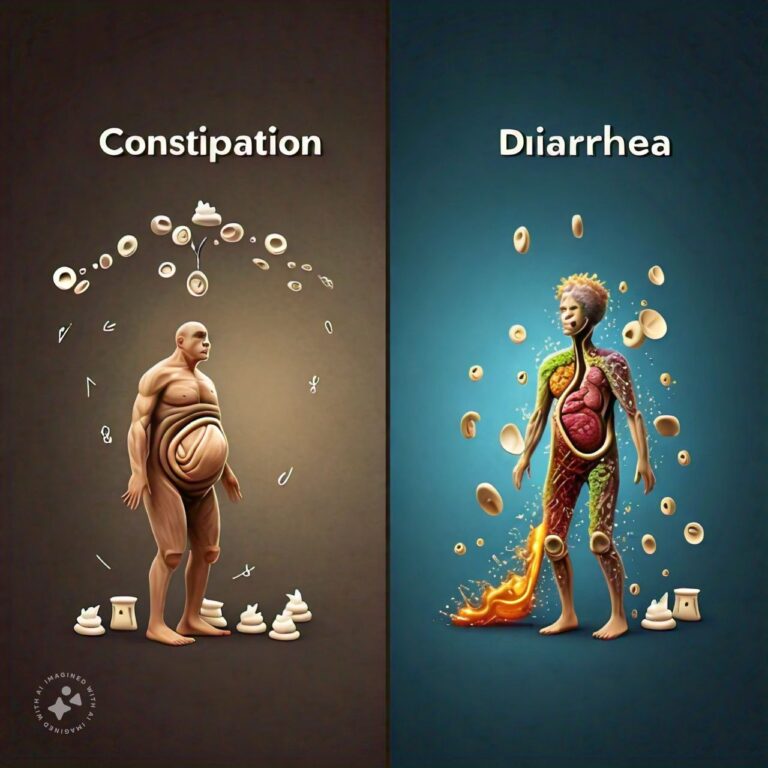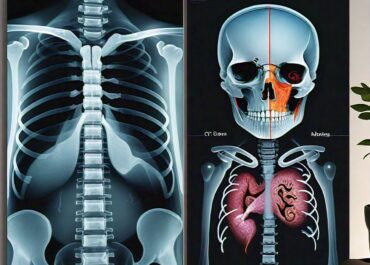
Differences Between Constipation and Diarrhea
Constipation and diarrhea are two of the most common gastrointestinal issues that affect people of all ages. Both conditions involve disruptions to normal bowel movements, but they are essentially opposites in terms of their symptoms and causes. Constipation refers to infrequent or difficult bowel movements, often accompanied by hard, dry stools. Diarrhea, on the other hand, involves loose, watery stools that occur more frequently than normal.
Despite being opposite conditions, both constipation and diarrhea can cause significant discomfort and may sometimes indicate underlying medical conditions. Understanding the key differences between these two conditions, as well as their causes and treatments, is crucial for maintaining good digestive health.
Constipation Overview
What is Constipation?
Constipation is a condition in which an individual experiences infrequent, difficult, or incomplete bowel movements. A person is generally considered to be constipated if they have fewer than three bowel movements per week, and the stools are often hard, dry, and difficult to pass. While occasional constipation is common, chronic constipation can lead to discomfort, pain, and complications such as hemorrhoids, anal fissures, or fecal impaction.
Constipation can occur due to a variety of factors, including poor diet, lack of physical activity, dehydration, and certain medical conditions. While it is usually not a serious condition, it can significantly impact a person’s quality of life if left untreated.
Key Characteristics of Constipation
- Infrequent Bowel Movements: One of the hallmark signs of constipation is having fewer than three bowel movements per week. In some cases, a person may go several days or even weeks without passing stool.
- Hard and Dry Stools: Constipated individuals often pass hard, dry stools that are difficult to expel. This can lead to discomfort and straining during bowel movements.
- Straining During Bowel Movements: Many people with constipation report having to strain excessively to pass stool. This can lead to complications such as hemorrhoids or anal fissures.
- Feeling of Incomplete Evacuation: People with constipation may feel as though their bowel movements are incomplete or that they haven’t fully emptied their bowels, even after going to the bathroom.
- Abdominal Discomfort: Constipation is often associated with bloating, cramping, or a sense of fullness in the abdomen. These symptoms can vary in intensity depending on the severity of the constipation.
Causes of Constipation
- Low Fiber Diet: A diet low in fiber is one of the most common causes of constipation. Fiber adds bulk to the stool and helps it move through the intestines more easily. Diets rich in processed foods, meat, and dairy but low in fruits, vegetables, and whole grains are often linked to constipation.
- Dehydration: Not drinking enough water can cause the stool to become hard and difficult to pass. Proper hydration is essential for regular bowel movements.
- Lack of Physical Activity: A sedentary lifestyle can contribute to constipation. Regular physical activity helps stimulate the muscles of the digestive tract, aiding in the movement of stool.
- Medications: Certain medications, such as opioids, antacids containing aluminum or calcium, antidepressants, and some blood pressure medications, can cause constipation as a side effect.
- Medical Conditions: Chronic constipation can be a symptom of underlying medical conditions such as hypothyroidism, irritable bowel syndrome (IBS), diabetes, or neurological disorders like Parkinson’s disease.
- Changes in Routine: Traveling, changes in eating habits, and disruptions in normal daily routines can trigger temporary constipation.
- Ignoring the Urge: Ignoring the urge to have a bowel movement can lead to constipation over time. If the stool stays in the colon for too long, it becomes harder and more difficult to pass.
Treatment for Constipation
- Dietary Changes: Increasing fiber intake by eating more fruits, vegetables, legumes, and whole grains is a primary treatment for constipation. Fiber supplements, such as psyllium or methylcellulose, can also be helpful.
- Hydration: Drinking plenty of water and other non-caffeinated fluids helps keep stools soft and easier to pass.
- Exercise: Regular physical activity stimulates bowel movements and improves digestion. Activities such as walking, jogging, and yoga can be particularly beneficial.
- Over-the-Counter Laxatives: Laxatives, stool softeners, and fiber supplements can provide short-term relief from constipation. However, they should be used cautiously and under a doctor’s supervision for chronic constipation.
- Medical Treatment: In cases of chronic or severe constipation, a doctor may prescribe medications that stimulate bowel movements or recommend further testing to rule out underlying conditions.
Complications of Constipation
- Hemorrhoids: Straining during bowel movements can cause swollen veins in the rectum and anus, leading to hemorrhoids, which can be painful and may bleed.
- Anal Fissures: Passing hard stools can cause small tears in the skin around the anus, known as anal fissures, which can be painful and may bleed during bowel movements.
- Fecal Impaction: In severe cases, stool can become so hard and dry that it becomes impacted in the intestines, requiring medical intervention to remove it.
- Rectal Prolapse: Chronic straining during bowel movements can cause the rectum to stretch and protrude from the anus, a condition known as rectal prolapse.
Diarrhea Overview
What is Diarrhea?
Diarrhea is characterized by loose, watery stools that occur more frequently than normal. Most people experience diarrhea at some point in their lives, and it is usually a short-term condition that resolves on its own. However, chronic diarrhea or severe acute diarrhea can lead to dehydration, electrolyte imbalances, and other complications.
Diarrhea can be caused by infections, certain foods, medications, or underlying medical conditions. In some cases, it may be a symptom of a more serious condition, such as inflammatory bowel disease (IBD) or irritable bowel syndrome (IBS). Acute diarrhea, which lasts for a few days, is commonly caused by infections or food intolerances, while chronic diarrhea can persist for weeks or months and may require medical evaluation.
Key Characteristics of Diarrhea
- Frequent Bowel Movements: Diarrhea involves having more frequent bowel movements than normal, typically more than three times a day.
- Loose, Watery Stools: The stool in diarrhea is loose, watery, and often accompanied by a sense of urgency. In some cases, diarrhea may contain mucus, blood, or undigested food.
- Abdominal Pain and Cramps: Diarrhea is often associated with abdominal pain, cramps, and discomfort. These symptoms may vary in severity depending on the underlying cause of the diarrhea.
- Dehydration: Diarrhea can lead to dehydration, especially if it is severe or prolonged. This is because the body loses significant amounts of water and electrolytes through frequent, watery bowel movements.
- Nausea and Vomiting: In some cases, diarrhea may be accompanied by nausea and vomiting, particularly if it is caused by an infection or food poisoning.
Causes of Diarrhea
- Infections: Bacterial, viral, or parasitic infections are common causes of diarrhea. Examples include infections caused by E. coli, Salmonella, Rotavirus, and Giardia. Travelers' diarrhea is often caused by consuming contaminated food or water in foreign countries.
- Food Intolerances: Certain food intolerances or sensitivities, such as lactose intolerance or gluten sensitivity, can trigger diarrhea after consuming specific foods.
- Medications: Some medications, particularly antibiotics, can disrupt the balance of bacteria in the gut and lead to diarrhea. Other medications that may cause diarrhea include antacids containing magnesium and certain chemotherapy drugs.
- Digestive Disorders: Chronic conditions such as irritable bowel syndrome (IBS), Crohn’s disease, ulcerative colitis, and celiac disease can lead to ongoing or recurring diarrhea.
- Artificial Sweeteners: Some artificial sweeteners, particularly sorbitol and mannitol, which are found in sugar-free products, can cause diarrhea in some individuals.
- Overeating or High-Fat Diets: Consuming large amounts of food, particularly foods high in fat, can sometimes trigger diarrhea, as the digestive system struggles to process the excess fat.
Treatment for Diarrhea
- Rehydration: The most important treatment for diarrhea is replacing lost fluids and electrolytes to prevent dehydration. Oral rehydration solutions (ORS), sports drinks, and clear soups are commonly recommended.
- Dietary Adjustments: People with diarrhea should avoid foods that can worsen symptoms, such as dairy products, high-fat foods, and caffeine. The BRAT diet (bananas, rice, applesauce, and toast) is often recommended as it consists of bland, low-fiber foods that can help firm up stools.
- Over-the-Counter Medications: Anti-diarrheal medications such as loperamide (Imodium) or bismuth subsalicylate (Pepto-Bismol) can help reduce the frequency of bowel movements and relieve discomfort.
- Probiotics: Probiotics may help restore the balance of healthy bacteria in the gut, particularly if diarrhea is caused by antibiotics.
- Medical Treatment: If diarrhea is caused by an underlying condition, such as inflammatory bowel disease or an infection, specific treatment will be required. In some cases, doctors may prescribe antibiotics or other medications to treat the underlying cause.
Complications of Diarrhea
- Dehydration: Dehydration is the most common complication of diarrhea, especially in children and older adults. Severe dehydration can lead to serious health issues, including electrolyte imbalances and kidney failure.
- Nutrient Malabsorption: Chronic diarrhea can interfere with the body’s ability to absorb nutrients from food, leading to malnutrition, weight loss, and deficiencies in vitamins and minerals.
- Electrolyte Imbalance: Diarrhea can cause the loss of important electrolytes, such as sodium, potassium, and chloride. This can lead to muscle cramps, weakness, and heart rhythm disturbances.
- Infection: In cases where diarrhea is caused by an infection, particularly bacterial infections, it can lead to complications such as sepsis or the spread of the infection to other parts of the body.
Differences Between Constipation and Diarrhea
- Stool Consistency:
- Constipation: Involves hard, dry stools that are difficult to pass.
- Diarrhea: Involves loose, watery stools that are passed more frequently than normal.
- Frequency of Bowel Movements:
- Constipation: Typically involves fewer than three bowel movements per week.
- Diarrhea: Typically involves more than three loose bowel movements per day.
- Causes:
- Constipation: Often caused by a low-fiber diet, dehydration, lack of physical activity, or certain medications.
- Diarrhea: Often caused by infections, food intolerances, medications, or digestive disorders.
- Symptoms:
- Constipation: Associated with abdominal discomfort, bloating, straining, and a feeling of incomplete bowel movements.
- Diarrhea: Associated with abdominal cramps, frequent urges to pass stool, nausea, and dehydration.
- Complications:
- Constipation: Can lead to complications such as hemorrhoids, anal fissures, and fecal impaction.
- Diarrhea: Can lead to dehydration, nutrient malabsorption, and electrolyte imbalances.
Conclusion
While constipation and diarrhea are opposite conditions, they both involve disruptions to normal bowel movements and can cause significant discomfort. Constipation is characterized by infrequent, difficult, or incomplete bowel movements, often caused by poor diet, dehydration, or lack of physical activity. Diarrhea, on the other hand, involves frequent, loose, and watery stools, often caused by infections, food intolerances, or digestive disorders.
Understanding the differences between constipation and diarrhea, including their causes, symptoms, and treatments, can help individuals manage their digestive health and seek appropriate medical care when needed. Both conditions can usually be managed with lifestyle changes, dietary adjustments, and over-the-counter treatments, but chronic or severe cases may require medical intervention.
Maintaining a healthy diet, staying hydrated, and engaging in regular physical activity are key to preventing both constipation and diarrhea and promoting overall digestive well-being.
FAQs
Related Topics
- All
- Animals
- Diseases
- Health
- Money
- Politics
© 2024 OnYelp.com. All rights reserved. Terms and Conditions | Contact Us | About us





